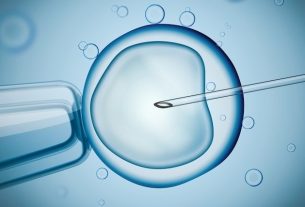Symptoms of fertilization, such as abdominal pain and pinkish discharge, can be felt by some women in the first few days after the embryo attaches to the wall of the uterus, where it will develop during pregnancy.
However, these signs tend to be very subtle and, therefore, many women do not even notice them, even when they are trying to identify a sign that indicates whether they are pregnant. Even so, the first sign to look out for is the appearance of a small, light pink bleed, which appears up to 3 days after sexual intercourse.
The best way to confirm pregnancy and fertilization is to wait until your period is late and take a pharmacy test. See how the pharmacy test works and when to take it.

First signs of fertilization
The signs and symptoms of fertilization are not always present or may be difficult to identify, but the most common are:
- Mild abdominal cramps on the 6th or 7th day after the fertile period;
- Pinkish discharge up to 3 days after intercourse;
- Tiredness and drowsiness;
- Mild and persistent headache;
- Swollen and painful breasts.
For fertilization to occur and, consequently, a pregnancy, a viable sperm must meet an egg, and the woman must be in her fertile period. Eggs remain viable for 12 to 24 hours on their way to the uterus, while sperm survive between 48 and 72 hours.
After about 4 weeks of fertilization, the first symptoms of pregnancy begin to appear, which are usually morning sickness and delayed menstruation. See what the 10 first symptoms of pregnancy are.
To know how to detect the first signs of pregnancy, it is important to know your ovulation date, so take the test and find out when your next fertile period will be:
How to confirm pregnancy
To detect pregnancy, you can first take a pharmacy test and, in case of a positive result, the pregnancy can be confirmed through the beta-HCG blood test, which can be done as soon as your period is late. See how pregnancy tests work.
Furthermore, another way to detect pregnancy is through an ultrasound exam, which can identify the presence of the embryo in the uterus and the baby’s heartbeat. It is also important to remember that after confirmation of pregnancy, you should see a gynecologist and begin prenatal care.
Bibliography
- CLEVELAND CLINIC. Pregnancy: Ovulation, Conception & Getting Pregnant. 2019. Disponível em: <https://my.clevelandclinic.org/health/articles/11585-pregnancy-ovulation-conception–getting-pregnant>. Acesso em 03 dez 2019
- BRAZILIAN FEDERATION OF GYNECOLOGY AND OBSTETRICS ASSOCIATIONS. Prenatal Care Manual. 2014. Available at: <https://www.febrasgo.org.br/images/arquivos/manuais/Manuais_Novos/Manual_Pre_natal_25SET.pdf>. Accessed on 03 Dec 2019
- AMERICAN PREGNANCY ASSOCIATION. Pregnancy Symptoms – Early Signs of Pregnancy. 2019. Disponível em: <https://americanpregnancy.org/getting-pregnant/early-pregnancy-symptoms/>. Acesso em 03 dez 2019
- NATIONAL HEALTH SERVICE. Signs and symptoms of pregnancy. 2017. Disponível em: <https://www.nhs.uk/conditions/pregnancy-and-baby/signs-and-symptoms-pregnancy/>. Acesso em 03 dez 2019

Sign up for our newsletter and stay up to date with exclusive news
that can transform your routine!
Warning: Undefined array key "title" in /home/storelat/public_html/wp-content/plugins/link-whisper-premium/templates/frontend/related-posts.php on line 12
Warning: Undefined array key "title_tag" in /home/storelat/public_html/wp-content/plugins/link-whisper-premium/templates/frontend/related-posts.php on line 13



